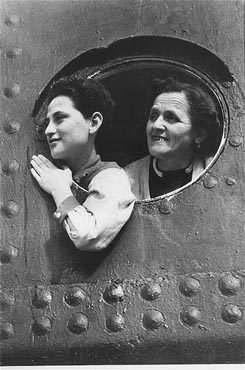
What does “never again” mean? We use this phrase to signal a determination not to let another Holocaust happen, another genocide, but then we Americans watch from a distance as killing occurs in one country after another. partly because we simply don’t want to get involved in foreign wars, and partly because it’s not so easy to decide what constitutes a genocide which requires foreign intervention.
And all this talk of Trump being “the next Hitler” and his administration being fascists, and the Weimer-like fighting in the streets (because it wasn’t just Brownshirts terrorizing the population, but were communists vs. Nazis fighting each other), as well as the fact that I find it creepy, at best, that people abroad are protesting, leads me to think about the fact that, well, you know the old saying of “hindsight is 20/20.”
Well, that and I want to get some distance from the inauguration and the protests, and see what the Trump administration’s first concrete steps are.
So here’s my question: imagine you found yourself living 80-odd years ago, not knowing what the future would bring but having your modern convictions of equality, anti-fascism, etc. And, no, you’re not transported to Germany; you’re transported to the U.S.
It’s 1933. Hitler becomes chancellor. The United States is mired in Depression. Not knowing anything about the future of Nazi Germany, how, if at all, would you respond to this event? Would you march in the streets? Support economic sanctions (to the extent that there would be any meaning to this in this pre-globalization economy)? Increase immigration quotas for German Jews, or any European Jews, or even allow unlimited immigration?
It’s 1936. Nazi Germany hosts a successful Olympics, then turns around and, after the cameras are gone, stepped up its persecution of Jews. They are prohibited from civil service jobs, stripped of citizenship, and prohibited from marrying ethnic Germans. Jewish children are removed from public schools. Jewish businesses are subjected to boycotts. As an American citizen, how do you respond?
It’s 1938. Nazi Gemany has annexed Austria, and helped itself to the Sudetenland region of Czechoslovakia. Neville Chamberlain proclaimed “peace in our time” because the British and French were so scarred by World War I that they wanted to avoid war at all costs. Do you object?
It’s 1939. Nazi Germany has invaded Poland.
It’s 1940. Nazi Germany has invaded the Netherlands, Belgium, France, and begun it’s bombing campaign over England.
It’s June 1941. Nazi Germany has invaded the Soviet Union.
Remember, I don’t want an answer that “knows” that the Jews have to be rescued from their pending demise. Given the “facts on the ground,” and given the ongoing Great Depression in America at the time, but with the benefit of hindsight only in terms of a general sense of the importance of human rights, how do you believe you would have reacted at the time?
Image: “StLouisPorthole”. Licensed under Public Domain via Commons – https://commons.wikimedia.org/wiki/File:StLouisPorthole.jpg#/media/File:StLouisPorthole.jpg
















